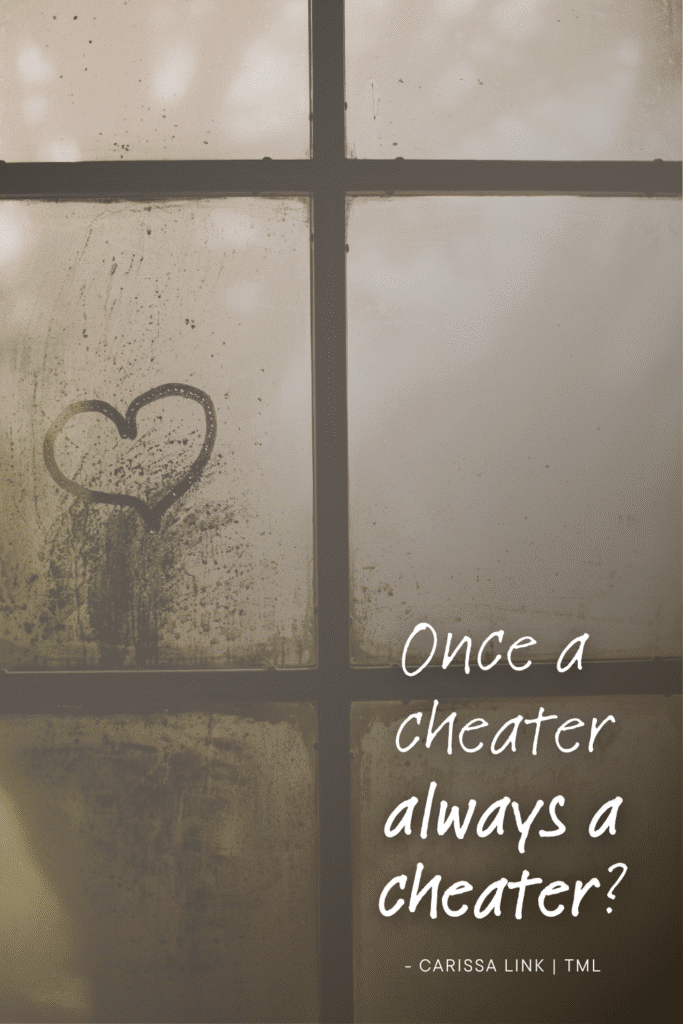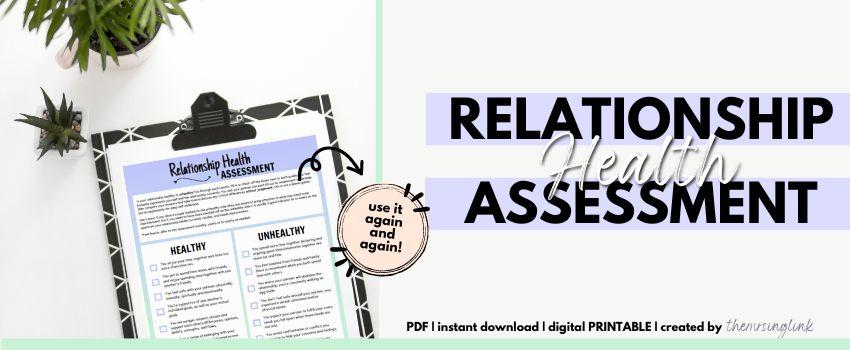If they cheated, are they destined to repeat?
If you asked me in my 20s, or even within the last 5 years, I would say absolutely, “Once a cheater always a cheater.” I also used to believe cheating was unforgivable and unredeemable (I’ve even stated this in older posts from 5+ years ago).
Has that all changed for me, per say? My thinking has evolved, my heart has softened, and I’m willing to be more open. So what’s the point of this post? I guess simply to reflect on some of the perspectives, insights and realizations I’ve been introduced to as well as listening better to others (who have either cheated or been cheated on) and what they have to say.
This isn’t a right or wrong kind of post – though cheating is always wrong. That doesn’t change. What we’re unpacking here is the common prompt and response to cheating we often hear time and time again.
I was inspired by a recent debate online between individuals who had cheated on their partners, and it was interesting to get their take on certain questions and perspectives, which are expressed throughout the post.
I also want to hear what you think, so drop me a comment, but let’s remember to please be respectful as we delve into this topic.

“Once a ___ always a ____.”
Let’s insert some other words into the prompt, and see what happens.
“Once a liar always a liar.“
“Once a thief always a thief.“
“Once an A-hole always an A-hole.“
“Once a failure always a failure.“
Yet there would still be some level of sensitivity towards something like, “Once a good person always a good person.” Would this be fair and accurate?
Here’s what I’m starting to understand with this statement “Once a cheater always a cheater“: it’s as if we’ve lost faith in people being capable of change, we’re merciless and unforgiving, and by utilizing that statement against others we’re almost cursing them with it.
Sure, are there people who chronically and pathologically cheat with no remorse, conviction and change of heart or behavior? Absolutely, yet both sides exist at the same time. There are people who cheat, want to cheat and won’t stop cheating, then there are people who cheat, don’t want to cheat and never do it again.
Moreover, the statement is as if people who do wrong are perpetually doomed to repeat their offenses (i.e., wrong doings, mistakes, poor choices, impulse desires). That just simply isn’t true nor is it helpful when we all do [repeat the same] things we’re not proud of every single day. We also continue doing things we know we shouldn’t yet lean on justification while non-consenting to ramifications.
So, what does this statement do? It only serves to keep people chained to the things they’ve done and aren’t proud of, and because of that people are only more likely to continue succumbing to those things.
Most don’t want to make treachery their identity
Before, I would have shouted from the rooftops that cheaters are proud to be cheaters. Mainly because those know what they’re doing; they arrogantly consented to such a decision while completely aware of (and indifferent toward) not only the possible repercussions but inflicted harm.
While I do still believe cheating comes from a very arrogant and selfish place, it’s impossible to actually believe that most people are “Proud Cheaters” or live out their life and who they are boasting in their cheating capabilities and desires as if it defines them.

Cheating will always boil down to choice
Nobody is knocked senseless into cheating, nobody is tricked into cheating, nobody is bribed to cheat, and nobody is persuaded to cheat. To knowingly be unfaithful to your partner will always boil down to a conscious choice. That also includes relief, self-preservation and fulfilling unmet satisfaction and desires.
There are those who may be convinced they were driven to cheat (by their partner or the relationship). Indirectly, at best, the claim that those can be led or provoked to cheat only elevates an individual’s attraction to compulsive satisfaction and escapism, or their lack of self-restraint.
Since we’re talking about the idea “Once a cheater always a cheater,” the point I’m drawing attention to here is that an unfaithful partner knows and consents to infidelity. They are aware of the immorality, except there always being a “But…“
Therefore, in the midst of a rocky, ruthless, empty and love-less relationship, which are often to blame, the person who cheats knowingly does so without relinquishing their partner and ending the relationship.
For those who oppose the idea of cheating being a choice, I challenge, are simply refusing to claim cheating as monogamously immoral when their troubled relationship (and partner) is the scapegoat for allegedly propelling them into the arms of another. That doesn’t take away from the fact they know exactly what they’re doing is disproportionally unfair and unjust.
[Related Read: Cheating on your partner doesn’t start in the bedroom..]
Those who cheat usually enjoy it in the moment
I have a hard time believing most people cheat in order to get a rise out of their partner, or to jump-start the relationship. With cheating as widespread as it is, it would be fair to assume that there’s an aspect of it for those that is blindly entertaining in the moment.
That’s not to say those individuals don’t experience regret, which is typically thereafter, but the point here is that the act, in the thick of it, is undeniably tempting and self-gratifying.
For a cheater to be capable of enjoying the act in the moment only proves we are not exempt from the likelihood and capability of hurting even those we Love when our desires can easily outweigh sacrifice.
Still, endorsing “Once a cheater always a cheater” as one size fits all only pronounces the inability for change and redemption instead of exposing the truth and freedom from the behavior in the first place.
People who cheat can still claim to Love their partner
I find it crazy to admit this, even to myself, but there’s a part of me that can agree. In addition, yes, there are obviously people who cheat and do not Love their partner. We can’t deny this since cheating does not discriminate based on connectivity, commitment status and duration of togetherness – people cheat 35 years into marriage as well as 35 days into entering a relationship.
I think there’s this presumption behind “Once a cheater always a cheater” that basically says someone who is capable of cheating does not truly Love their partner, or that someone who cheats never Loved (and can never Love) their partner to begin with.
To Love – are we quick to define this in ways that suit or agree with our own devised, narrow depiction? People are often quick to say that a cheating partner does not Love their partner because the act is the pinnacle of anti-Love. Meaning, the singular act of cheating is contradictory to Love. I understand this, I really do.
Now I’m just verbal processing, so bear with me. Then anything that is opposing of Love is anti-Love, right? That being said, if my husband lied to me about picking up an extra shift at work, am I to claim he actually hasn’t, doesn’t and can’t Love me (at all)?
My point here is while I believe cheating can be considered the worst [anti-loving] form of betrayal your partner could do (to you and to the relationship), I also see the validity in someone who cheats still Loving their partner.
Here’s the difference for me: I can fully get behind this idea when there’s genuine accountability and self-reproach for acts of anti-Love.

A cheater wouldn’t excuse their partner cheating on them
I said excuse to encompass other words like justify, condone and pardon. When I say a cheater wouldn’t excuse their partner for cheating it’s because they have corroborated that every aspect of cheating (the choice, the behavior, the act(s), the temptations and desires, the conscious betrayal and evidential deceit) is not only inexcusable and unacceptable but lethal to trust and connection.
This means if you were to ask someone who was unfaithful to their partner, if the tables were turned, they would feel strongly against it.
Notice I didn’t use the word forgive – that’s because I do think it’s possible for a cheater to forgive a cheater, particularly, as it is possible for a faithful partner to forgive a cheating partner.
A truly repentant cheater is also self-forgiving
For many, they may not like that title alone. What I’m saying here is that someone who is truly convicted by their action, has accepted accountability, and is proactively turning around can only do so if they have forgiven themselves. This would entirely go against “Once a cheater always a cheater“.
Unfortunately, from a victim standpoint, how dare the perpetrator [be able to] forgive themselves for what they did to one they supposedly Love?
Still, aren’t we taught amidst our shortcomings, mistakes, poor choices and even intentionally vile acts that to overcome, move forward, and become *new* (to change or do *better*) we are to forgive ourselves? That means not holding onto previous trespasses, which requires nullifying the proclamation of “Once a cheater always a cheater“.
I know, that was probably a load to take in. But this was simply jotting down my thoughts and perspective, so what do you think? What’s your take on the whole, “Once a cheater always a cheater”?
